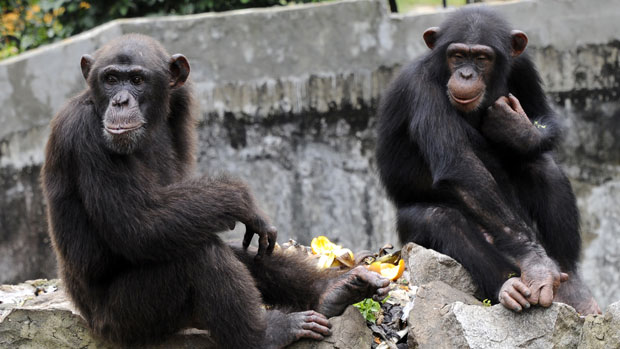Chimps do not have human rights after all, court rules
US court refuses to recognise chimp as 'legal person' with human right to freedom

A free daily email with the biggest news stories of the day – and the best features from TheWeek.com
You are now subscribed
Your newsletter sign-up was successful
Chimpanzees do not have human rights and do not have to be released from captivity, a US court has ruled.
The New York state appeals court said that caged chimpanzee Tommy cannot be recognised as a "legal person" as he cannot "bear any legal duties", the BBC reports.
A campaig group had argued that chimps have such similar characteristics to humans that they deserve basic rights, including freedom. The Nonhuman Rights Project said it will appeal against the decision, citing other New York appeals court rulings it says are at odds with yesterday's verdict.
The Week
Escape your echo chamber. Get the facts behind the news, plus analysis from multiple perspectives.

Sign up for The Week's Free Newsletters
From our morning news briefing to a weekly Good News Newsletter, get the best of The Week delivered directly to your inbox.
From our morning news briefing to a weekly Good News Newsletter, get the best of The Week delivered directly to your inbox.
The campaigners had argued that a privately owned chimpanzee named Tommy was unlawfully imprisoned in New York, and should be transferred to a sanctuary in Florida.
Tommy, the chimpanzee at the heart of the case, is believed to be about 40 years old. A former entertainment chimp, he was given to Patrick Lavery about 10 years ago.
Lavery is said to be pleased with the outcome of the case. According to Fox News, he told the court Tommy lives in a seven-room enclosure in Gloversville with lots of toys and other "enrichment."
In its ruling, the five-judge panel said: "So far as legal theory is concerned, a person is any being whom the law regards as capable of rights and duties.
A free daily email with the biggest news stories of the day – and the best features from TheWeek.com
"Needless to say, unlike human beings, chimpanzees cannot bear any legal duties, submit to societal responsibilities or be held legally accountable for their actions.''
-
 Local elections 2026: where are they and who is expected to win?
Local elections 2026: where are they and who is expected to win?The Explainer Labour is braced for heavy losses and U-turn on postponing some council elections hasn’t helped the party’s prospects
-
 6 of the world’s most accessible destinations
6 of the world’s most accessible destinationsThe Week Recommends Experience all of Berlin, Singapore and Sydney
-
 How the FCC’s ‘equal time’ rule works
How the FCC’s ‘equal time’ rule worksIn the Spotlight The law is at the heart of the Colbert-CBS conflict
-
 Epstein files topple law CEO, roil UK government
Epstein files topple law CEO, roil UK governmentSpeed Read Peter Mandelson, Britain’s former ambassador to the US, is caught up in the scandal
-
 Iran and US prepare to meet after skirmishes
Iran and US prepare to meet after skirmishesSpeed Read The incident comes amid heightened tensions in the Middle East
-
 Israel retrieves final hostage’s body from Gaza
Israel retrieves final hostage’s body from GazaSpeed Read The 24-year-old police officer was killed during the initial Hamas attack
-
 China’s Xi targets top general in growing purge
China’s Xi targets top general in growing purgeSpeed Read Zhang Youxia is being investigated over ‘grave violations’ of the law
-
 Panama and Canada are negotiating over a crucial copper mine
Panama and Canada are negotiating over a crucial copper mineIn the Spotlight Panama is set to make a final decision on the mine this summer
-
 Why Greenland’s natural resources are nearly impossible to mine
Why Greenland’s natural resources are nearly impossible to mineThe Explainer The country’s natural landscape makes the task extremely difficult
-
 Iran cuts internet as protests escalate
Iran cuts internet as protests escalateSpeed Reada Government buildings across the country have been set on fire
-
 US nabs ‘shadow’ tanker claimed by Russia
US nabs ‘shadow’ tanker claimed by RussiaSpeed Read The ship was one of two vessels seized by the US military